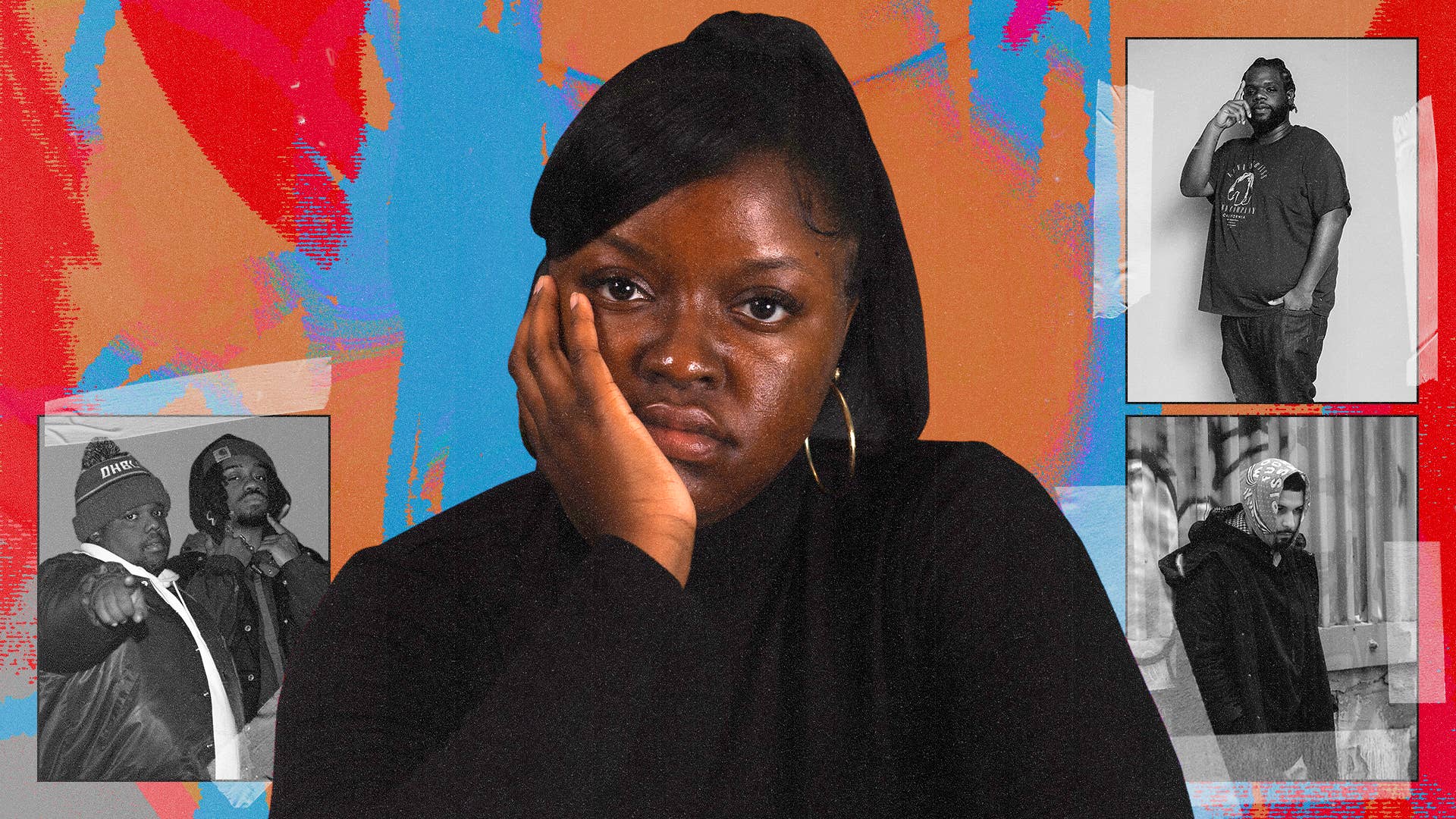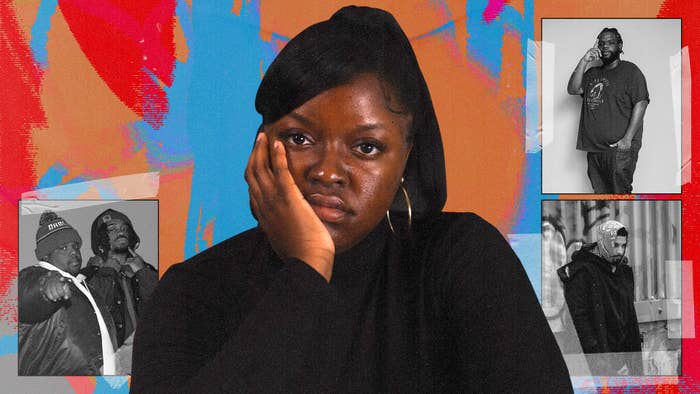
Welcome to Going Left, a new monthly column from Complex that highlights the indie rappers you need to be in tune with. It’s often difficult to keep up with the onslaught of weekly releases, so this monthly series is intended to help steer you in the right direction.
The plan is for this column to highlight indie rappers. I don’t want to call anyone “underground,” because that term is pretty ambiguous, but it’s clear that there’s a whole scene of artists releasing music that isn’t preoccupied with the charts, sales, or Grammy consideration. These artists may be considered “under the radar” to some, but I feel they’re consistently releasing some of the most thrilling, boundary-pushing rap out there, and they deserve to be amplified more.
While speaking to people for my “underground rap” story last year, one of the topics that kept coming up was how the media could do a better job of covering acts strictly on the basis of their talent. I think it’s important to remove hierarchical barriers from music, and this will be my little corner of the world to do that.
For the first edition of Going Left, I’m highlighting work from Che Noir and Radamiz, as well as collaborative projects from Lord Jah-Monte Ogbon and Navy Blue, and S!LENCE and Wavy Bagels. I also got to have a lengthy conversation with this month’s featured artist Che Noir about her Food For Thought album.
Che has earned a reputation as one of the sharpest up-and-coming MCs in the game over the past three years. The Buffalo rapper-producer has made a mark with streetwise, lyrically dense projects like Juno and 2020’s As God Intended, contributing to a historic movement of upstate New York rap. In January, she dropped Food For Thought, a project she says was “originally supposed to be an EP leading up to another album I was working on.” But anyone who’s a fan of her thoughtful lyricism isn’t surprised that the knowledge-focused project soon became an album. She told me about her aspirations as a producer, being a woman in rap, and how both COVID and the loss of her brother impacted the creative process of Food For Thought.
This first edition of Going Left has been long in the making, but I look forward to keeping future entries as current as possible with all the great work that’s out there. This month, start out with Che’s interview below, followed by some words on the three other albums.
Che Noir
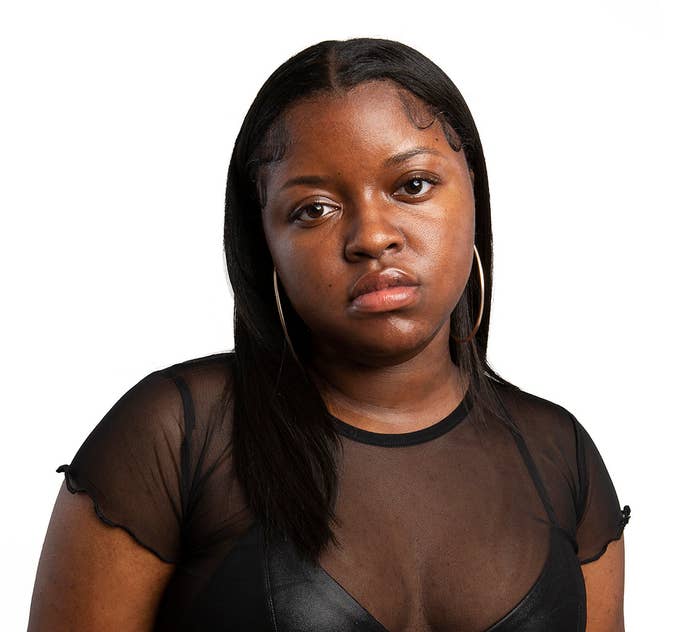
What made you want to center this project around the adage of “food for thought”?
It’s an idiom I’ve been using in my raps for years now, and it was just something I wanted because I love concept albums. One of my first albums that introduced me to a lot of my fans is Thrill of the Hunt 2, which I did with 38 Spesh. It was a concept album with a medieval time theme behind it. When I originally did Food For Thought, I didn’t even really have this concept of food and biblical terms. I just knew I wanted to call it Food For Thought, because that’s something that I live by.
What was the creative process like?
A majority of the songs were recorded at my home studio, and a few of them were recorded at the studio in Buffalo called GCR. I was working on two different albums when I was doing Food For Thought, so a lot of it was just picking [songs] from that album that work more with this one.
I stumbled through a lot of beats that I was getting from different producers and I narrowed it down. I even did another version [of this album] that the public isn’t going to hear, because it’s not the version that I want them to hear. I had beats from other producers that I was rapping over, and I did full songs. I even recorded an EP worth of material. But I ended up scraping that and narrowing it down. And once I started doing my own production, which was in the middle of doing Food For Thought, I started getting a different sound for the album and started conceptualizing for it.
Being a rapper who also produces, what’s it like for you when you’re making a beat? Do you hear the concept? Do you hear what you want to say?
Yeah, I definitely hear [what I want to say]. That’s the best thing about being a producer and a rapper. I started as a producer first and then worked my way into being a rapper. Then I started rapping a little bit after production, but I was more passionate about producing. So for me, that was the beauty of being in both lanes. I make a lot of beats, and I know what beats I would sound good on and beats that I wouldn’t sound good on. I definitely had the direction that I was going to go with in my head while I was in the middle of making the beat. It just was about putting the words on there.
Do you still predominantly use Fruity Loops to make beats?
Yes.
The thing that strikes me the most about your music is the way you fuse grittiness and hard lyrics with wisdom and gems. How cognizant are you of that balance during your songwriting process?
I’ve always treated songwriting like a conversation. I have a lot of wisdom-filled conversations on a daily basis. I have a lot of people around me, whether we’re just debating or conversing about life. These are conversations I have all the time.
What are some of the things you leaned on to help you make those personal breakthroughs that you express in art?
While I was recording Food For Thought, I took one of the biggest losses so far in my life. I lost my little brother on May 8, 2021. And in the process of me recording Food For Thought, I took two months off to deal with that emotionally. It was a very depressing experience for me. I’ve lost a lot of childhood friends very early, as a teenager, so I’ve definitely experienced loss, but it was different because it was my little brother. And for a minute, I couldn’t shake it off. I snapped out of it at some point and was able to focus and get back to work, but I was in and out of depression for like, three months. So for me, it’s really just leaning on making my brother—who was a rapper, too—proud, continuing his legacy, and using my platform to bring more awareness to his life.
In the middle of [grieving], I also caught COVID and I was down pretty bad from it. Having to sit down and be in the house for two weeks did something to me mentally, because I’m always on the go. I was in the house and once I started feeling better, it allowed me to rethink some things in my life. Coming out of COVID, that’s when I started going back into the album, giving it my all, and focusing on using my experiences and putting them right in the music.
After you came out of that period and decided to get back to the studio, what are some of the first songs you wrote and recorded?
I did “Communion,” which is the last song on the album. I remember when I made the beat, it was one of the most emotional songs I’ve ever written. I’ve talked about some personal things in my music, but it’s never been an emotional experience for me. I think it was more emotional because I was still going through it while I was writing about it. As soon as I was able to [refocus], that was one of the songs I recorded. I also recorded “Praises” and “Brains For Dinner” while I was coming out of it.
I’m sure “Communion” was cathartic for you to express, but how difficult was the idea of sharing all of that with the world?
When I wrote it and I was playing it back for my team, I loved it, but as it got closer to my release date, I was a little nervous, because I’ve never been that transparent in my music before. It’s an experience for people to get a chance to look into my world. And without the prettiness of it, they get to see how real it’s been for me. And that’s just a piece of it. Being able to get that out there, there was a nervous feeling at first, but now I’m confident and actually proud of being able to express myself like that through my music.
You voiced a preacher in between your “Communion” verses. Did you do that to add a little levity, given that it’s such a serious song?
Yeah, I definitely did that on purpose. Things worked out so perfectly for this album—more perfect than any album I’ve done so far in my career. I was actually supposed to get an artist on the hook to sing, but they never ended up sending it back to me, so I tried something different. I liked how it sounded, so I just kept going with it. And that actually brought more light to the track than I think that hook would’ve. So I had other plans for that song, but the final product I’m very happy with.
Some of the other tracks I wanted to talk about were “Table For 3” with Ransom and 38 Spesh and “Gold Cutlery” with Rome Streetz. How does it feel to go toe to toe, so to speak, with such respected lyricists?
I’ve always had to stay on my toes because I’ve been around Spesh for like, four years now. And when I first got around Spesh, that was something that he did warn me about. He was like, “We’re not going to go easy on you, so you got to stay on your toes.” It’s something that I was already prepared for. I had my pen very sharp early, so for me, it’s just always been about coming with my best and leaving it there. I did a cypher on Shade 45 a few years ago with Rome and Spesh, and even then, these two came in with their shit. But I feel like I’m always gonna come with my best.
Were either of those songs written in-person with the collaborators?
No. None of them. “Table For Three” was one of those songs that I did around this time last year. I made the beat, recorded it, and it was one of those songs that was supposed to be placed on another album, but I thought it sounded better with Food For Thought.
I also enjoyed “Ladies Brunch” with Armani Caesar and 7xvethegenius. How important was it to lock that record in with two other respected MCs?
Extremely important. And now that I think about it, I did record with 7xve. Me and her recorded in the same studio together. That’s the only collab I did where we were in the same studio. And I remember I had that song for a year before I was able to get Armani on it. All of us on that track are from Buffalo. Armani submitted the verse after we had already submitted the album, but we were able to still get her on here. So it was dope to have a track with not only all female rappers, but we’re all from Buffalo, too. And I produced the track.
There was a bar on the track: “Y’all giving crowns to niggas scared to rap with me.” How often do you feel that energy, like, dealing with other men in the industry where you feel like they might have a reticence to get on a song because of the stigma of getting out-barred by a woman?
I’ve been feeling like this since 2020. I had a really good run with three albums out that year. And a lot of like, lists that a lot of hip-hop blogs were putting out didn’t make sense to me. [The people at the top of these lists] are people that I’ve had conversations with, and I’m like, they still won’t get on a song with me. So when I said that bar, I was more trying to get these people who claim they’re the gatekeepers to wake up and go off of talent and not status or how popular this person may be or how much this person is selling. One way or another, they have the power to break artists who may not be getting the attention that they deserve. I’m like, damn, I did all that work and still ain’t getting the look I deserve.
How do you feel like women in rap are treated? There are still stigmas and misconceptions in the industry, but do you feel like things are better or worse than they’ve been for women in rap?
I would say it’s a little better. It’s not where it needs to be, though, because there’s still some misogyny I deal with within this game. So I wouldn’t say it’s all the way there, where it should be, but it’s definitely getting a lot better.
What do you think it’ll take to get to the point where there isn’t this demarcation of men and women in rap? And it’s not like, “You’re the best female MC,” but instead it’s just, “You’re one of the best MCs, period”?
To be honest with you, I don’t even know. I’ve had conversations with different people and I know a lot of it stems from women who were rapping and weren’t writing their raps. They were getting written by men. I don’t know if it really stems from that. It seems like a lot of it stems from that, but I don’t know what it would take. For me, I’ve always written my own [raps] and I’ve been making that very clear since I first came out. I’m very public about that, as far as me never having a ghostwriter, never having anyone write rhymes for me, and doing this all off my own pen and my own grind.
With me, down to the producing, I do it all. I’ve always been very public and expressive about that. But even with me being so public about it, the people around me who they claim are writing for me have said, “No, we’ve never written for her.” It still don’t stop these people from making up stories in their mind. So I don’t know what it would take. I’ve been going through this for three years now. I’ve been rapping for about seven or eight years. But I’ve been going through this as far as people assuming and making claims that I have a ghostwriter. Even though all of these people have publicly come out and said, “No, we’ve never written for Che,” they still make up stories in their mind about, “Oh, well, I know somebody wrote this for her.”
I remember when I first started, they were saying people that I’ve never even been in the studio with, wrote for me. And I was like, “What the hell? I’ve never even been in the studio with this person they’re saying wrote for me.” I don’t know when it’ll stop, but I know I’m never going to stop putting out my best work and putting my talent to the forefront.
Where do you think you’ve grown the most as an artist over the past couple of years?
I would say my content has grown. I’m a very low-key, shy type of person. I’m not really into the whole social media thing. I do it because this is what’s required of my career, but I’ve always been just more low-key. I would [also] say, inching out and getting a lot better with embracing being a people person, because that can either negatively or positively affect your career when you’re in this industry.
And [I’m also better at] putting footwork in. I went on tour last year to promote my album. Instead of relying on social media and promo behind that, I decided to put the footwork in. I took it back to how I was when I first started doing music and actually getting out here and selling merch and passing out CDs and talking to the people. Of course all of that was shut down for a while because of the pandemic, but I took that step.
Was shyness a factor in you not rhyming for so long?
Yeah. Because I wasn’t really the biggest people person. It’s something I had to pick up and learn over the years of being a rapper. When I was introduced to the industry by Spesh, I was introduced as a rapper. But when I first started doing music, my introduction to a lot of people in my hometown was as a producer. So the roles switched. As a producer, you can lay low and still get a name for yourself just off of your beats, but it’s different as a rapper.
Do you have any goals of producing albums for other artists?
Yeah. For me this year, I’m really starting to work towards my goal to produce full albums for artists. I have a list of people I want to produce for. I would love to produce a song for Rapsody, a couple Griselda members, of course, and get my feet wet with that. Being able to produce a song for them, I think that’d be amazing. This is the year where you’ll hear full albums produced by me, full EPs produced by me with other artists.
Are you currently working on anything with artists?
Right now, I have a local artist, his name is Jinx 716. I have a project with him that I’m producing. I’ve still got Stove God Cooks, Ransom, there’s a few other artists that’s on there. And that would probably be my first. That will be my first fully produced [project] with another artist. As far as anyone else, I’m still working on it, but I definitely plan on doing something else this year, as far as with my production.
How does being independent and being able to sell direct-to-consumer give you freedom as an artist?
I feel like the biggest thing is the creative control over your music. I don’t have anyone telling me to “make this type of song” or “rap over this type of beat.” Everything is all what I want to do. And that was very important for me from the beginning of my career, to have full creative control over my music.
Is there anything else that you want to express to the readers?
I have an album called The Lotus Child that I’m fully producing, that I should be able to get out this year. Me and Big Ghost have an album coming out this year. Those two projects are definitely things that my fans can look forward to for me.
New Albums You Need to Hear:
Lord Jah-Monte Ogbon & Navy Blue, ‘Beautifully Black’
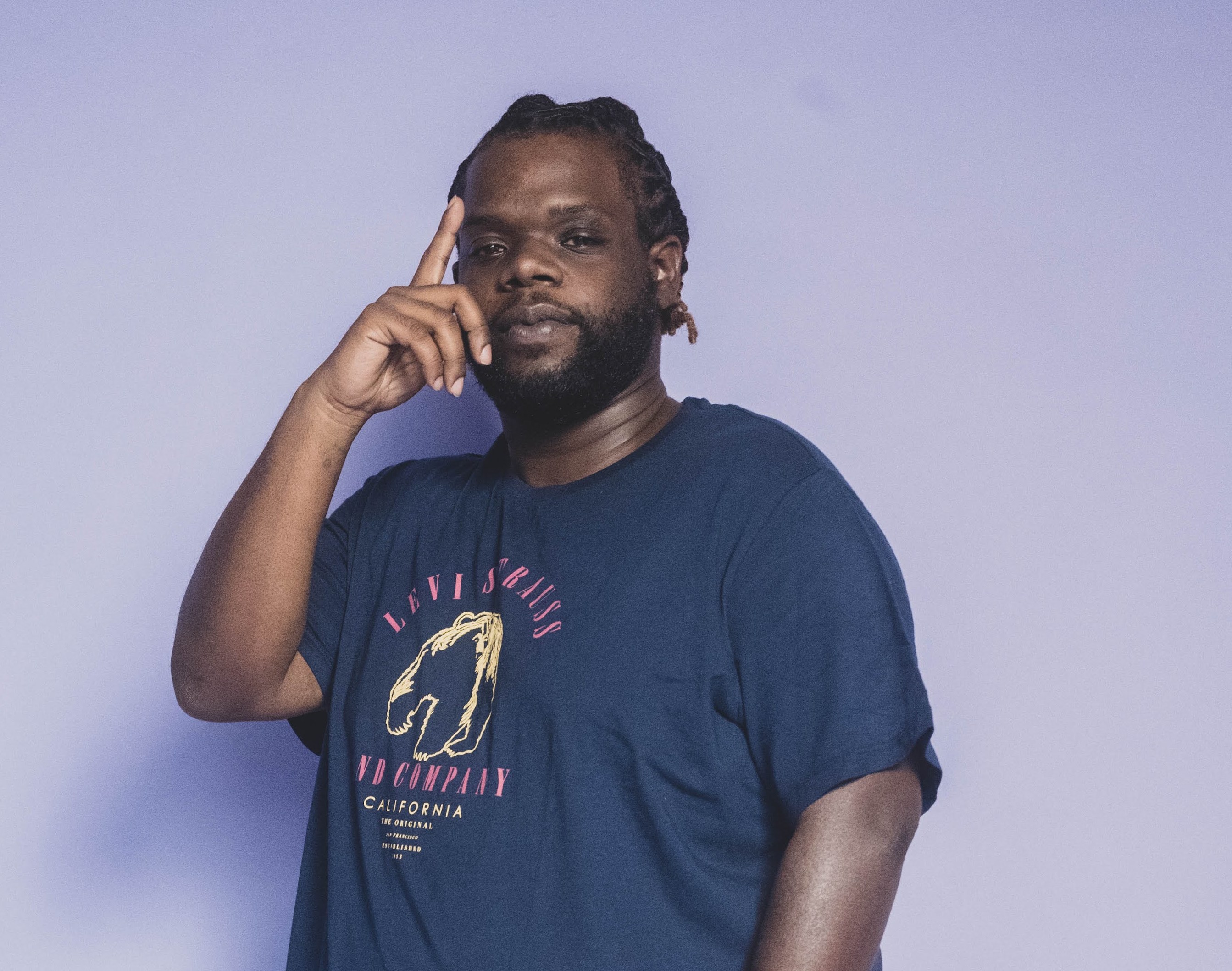
I’m already breaking my own rules for this column by highlighting Jah-Monte Ogbon’s next to latest release. (Lord Jah-Monte Ogbon just dropped his The Black Mobius album with Sadhugold a few days ago, but we had already talked about his November 2021 project for this column.) As the adage goes, there’s no such thing as new music anymore, just music you have or haven’t heard. And if you haven’t peeped Jah-Monte and Navy Blue’s collaboration project, you should get in tune.
The Charlotte-to-Brooklyn transplant is one of the best rappers going, as he displays over Navy’s immersive beats. The production sways from the jazzy (“The Missing Link”) to the two-step worthy old soul of tracks like “More Than Gold” with Phiik. And Jah-Monte matches the mood of every Navy Blue-produced beat on the project.
“I was so stoked because I knew Navy Blue from the song “The Mint” on Earl’s Some Rap Songs, so when he messaged me on Instagram it was an exuberant feeling,” he says. “So many thoughts jumped in and out of my head [Laughs]. I was wondering if this was an episode of Punk’D.” But when he realized Navy Blue was serious, he says, “I told myself I was on the road to stardom—no more eating at The Cookout out on Sugar Creek, only Steak 48 and better,” nodding to a pair of Charlotte establishments.
He fed listeners well throughout the project, unfurling his rhythmic flow and technical precision, while dishing on matters of love (“I Miss You”), personal growth (“Complex and Pitchfork Opinions”), and his “Oh Nah We Locked Boo” boast that “The Source would’ve gave me five mics, fix your eyesight.”
While admitting, “I had so much pressure on my shoulders making this album I didn’t get to tap into the bag that I wanted to,” Jah-Monte says, “when I heard the beat for the song that came to be ‘The Missing Link,’ I leaned forward to a more braggadocio approach with my subject matter for this album.”
The project was mostly recorded at a pair of studios in Charlotte with photographers in tow, capturing the history. One notable session Jah-Monte recalls is when fellow Charlotte MC Mavi came during the recording of “We Up On This Side” and gave him game on “maneuvering as an independent artist in the industry.” He remembers, “We couldn’t smoke in the studio, so we took a lot of breaks during recording and mixing to go outside and burn.”
It sounds like he found his creative zone on a project that he says was well received and one of his biggest projects to date. “I’m blessed to be in this position,” he says. And we’re blessed to be able to hear Beautifully Black.
Radamiz, ‘Every Bad Day Has Good News’
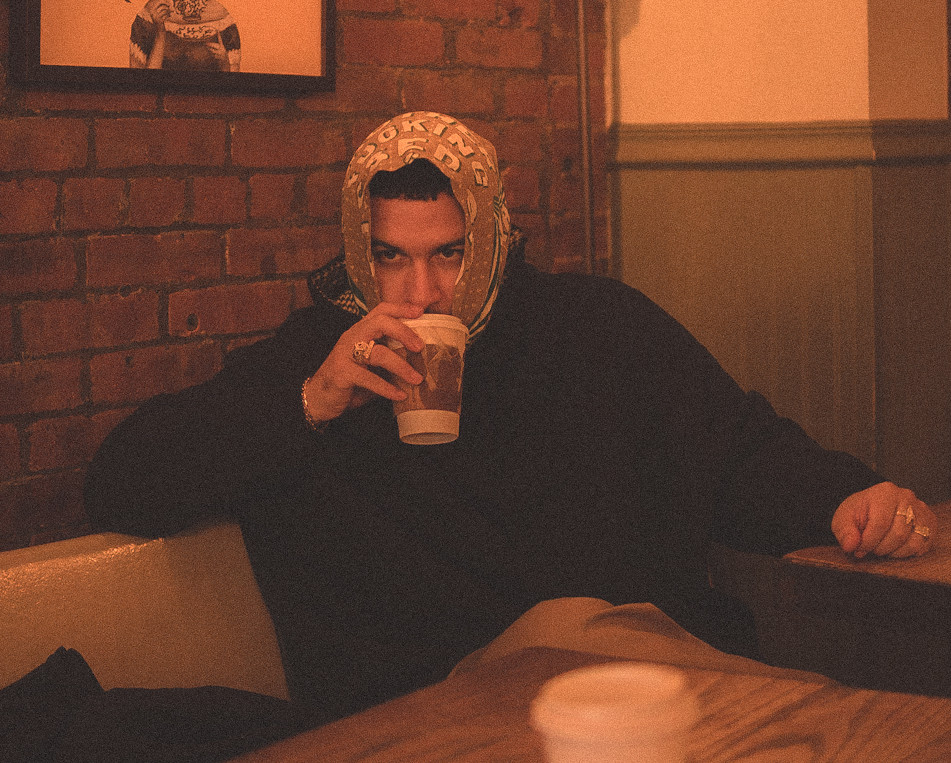
The dire synths and distant sirens of “The Price,” the opener of Radamiz’s Every Bad Day Has Good News mixtape, harken to the project’s cover: a flaming car in a dim parking lot. It wouldn’t have been surprising if Radamiz, a Yankee-capped sage of our times, carried that urgent tone throughout the tape, reflecting the tumult of the 2020s. But that intro likens to a lit flame meant to draw the listener to his pulpit, where encouraging gems, affirmation fodder, and supreme MC braggadocio are all abounding.
Every Bad Day Has Good News, true to the glass-half-full title, is a testament to balance, which was mostly created since the 29-year-old’s recent move to LA (“The Price” and “One World” were done in NYC). Radamiz says the tape is a reflection of his first time living somewhere outside of New York and “first time being an expecting father.” It was recorded at LA’s Basewood studio with mixtape producer and executive producer WASEEL, and Radamiz eventually realized (after artist NickyChulo’s observation) that he had a collection of songs “that was like a journal as opposed to a thematic story.”
But even if he didn’t record with a solitary north star in mind, the songs on the finished product collectively illustrate an MC who is relentless in both his positivity and craft. The mixtape shows a devotion to sleek, clean arrangements that are minimalist enough for Radamiz’s lyricism to shine, while radiating divergent vibes. “Like (Zagazig)” is a sunny track that harkens to his breakout “New York Don’t Love Me,” while “Beautiful Man” and “B What U Want In Life” are warmer tracks ripe for intimate “lighters up” performances.
No matter the beat, Radamiz is on his square. He’s capable of darting through cadences like a trapezist suspended in mid-air, but he knows when to jump off the bar theatrics, stick the landing, and offer summative jewels like, “Pain, the offspring of greed,” on “Apple Heads,” or, “Ignore the devil and make it a song,” on “Beautiful Man.” Another instant rewinder is his recollection that “Ma said that the angels fly because they take themselves lightly” on “Like (Zagazig).” He rhymes like he took heed to her wisdom, bouncing through the project with an “I make this look easy” kind of confidence in his delivery, which is subtly palpable but doesn’t betray his respect for the craft. The 13 tracks showcase an artist rhyming at the peak of what MCing is in 2022, which is why it’s not surprising that he feels it’s his best work yet.
He also says that even though the mixtape consists of figurative journal entries, “I guess there was still a theme: learning how to just find positivity in any day, no matter how nuanced. Optimism became survival, and taking control over the way I digest information and let it affect my emotions started becoming as real as the events themselves, in a real way.” The breakthroughs and recollections that fueled Every Bad Day Has Good News are now listener lessons. And now, even on their bad days, they have the chance to play this.
S!LENCE & Wavy Bagels, ‘mutatis mutandis’
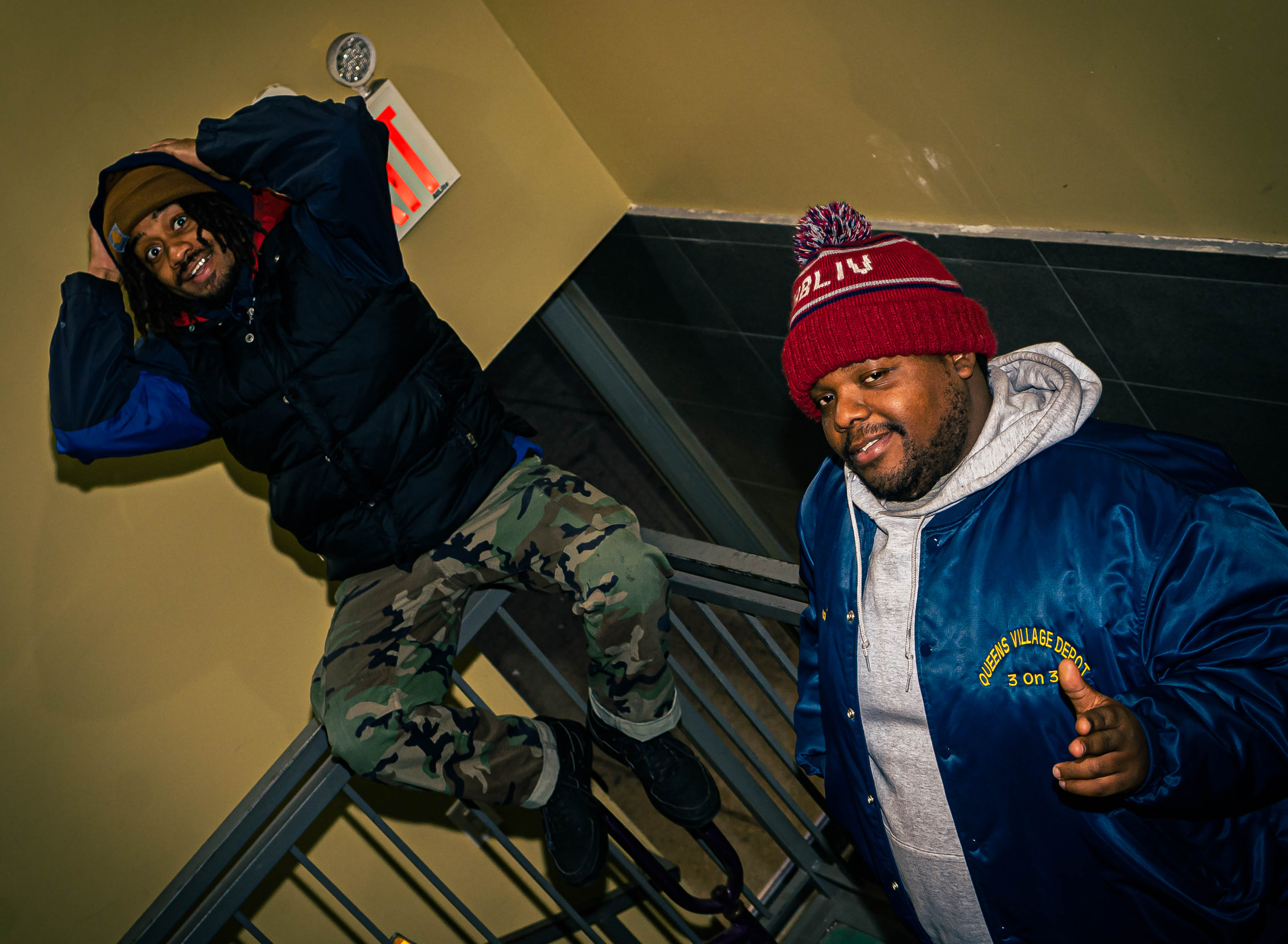
Brooklyn rapper S!LENCE says his mutatis mutandis album with artist/producer Wavy Bagels is “about confronting the ego, loss, self-soothing, and breaking cycles of rumination.” The album was crafted throughout 2020 and 2021, a period when many of us had no choice but to do just that.
The 15-track project plays back like much more than catharsis, though. In lieu of songs extrapolating epiphanies into fine-tuned, traditional songs, S!LENCE scatters his lessons amidst a body of work that excels on technical precision alone. He rhymes over a soundscape of Wavy’s warm, soulful breakbeats that form a sturdy base for him to weave through with his headrush of a delivery. He packs gifts in every pocket of each beat, creating an experience where his truths literally break through his rapid-fire lyricism.
S!LENCE uses a combination of imagery, metaphors, and quick nonsequiturs to communicate his life and times in a way that makes it more intriguing than plainly stating it. And once he jokingly laments, “I failed a CAPTCHA test the other day,” on the cheekily named “tri-state sex symbol,” ensuing listens make the project feel like a sci-fi transfusion of timeline doomscrolling as poetry. Take “Stew Peas,” for instance. He rhymes, “Granny was at the cookout with the heat tucked,” and just a couple bars later surmises, “The last mountain was just a mound of hiccups.” Intentional or not, the album becomes a meta glimpse of what it’s like trying to make sense of information in an age where you’re quickly inundated with even more to parse through.
He also excels at using the canvas of figurative battle and competition as double-meaning. He rhymes about “wolf pups coddled by the comforts of the combat,” on “divine comedy,” a social commentary in itself. On “Clean Slate” he rhymes, “accidentally hit the shot lefty,” summating our journey of falling up through a life we’re trying to make sense of. It’s these capsules of information that collectively tell the story of his “constant tension between the desire to change and fighting the potential slide into self-loathing,” as he says.
The artistic chemistry between him and Wavy comes from their friendship. “Wavy and I are actually comrades in real life,” he explains. “And the work would not have manifested with such warmth without the development of our chemistry and his sonic genius.” This isn’t someone merely rhyming over emailed beats—these are two friends helping each other express their stresses.
mutatis mutandis is a strong project that’s well worth your time, and if nothing else, an excuse for the debut of Going Left to include S!LENCE’s shoutout to “Octavia Butler for sending inspiration through the timestream.”

